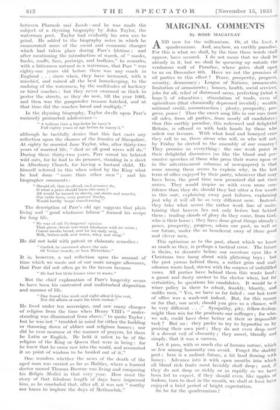MARGINAL COMMENTS
By ROSE MACAULAY
AND now for the millennium. Or, at the least, a quadrennium. And, anyhow, an earthly paradise' For this is what we shall, by the time these words shall appear, have secured. I do not mean that we shall be already in it, but we shall be queueing up outside the verdurous wall of Paradise, whose gates shall open to us on December 6th. Have we not the promises Of all parties to this effect ? Peace, prosperity, Progress, security, democracy ; League of Nations, armaments, limitation of armaments ; houses, health, social services, 'jobs for all, relief of distressed areas, perfecting (what S hope !) of education ; stimulation of trade, 'even of agriculture (that chronically depressed invalid) ; wealth, • national credit, reconstruction ; plenty, prosperity, pro- 'gress, peace ! Thus the sweet song lilts in our ears frofti all sides, from all parties,. from nearly all candidates ; thus this earthly paradise, this redeemed and delightful Britain, is offered us with both hands by those who solicit our favours. With what loud and honeyed cries they call to us, these sirens who will, or who will not, by Friday be elected to the assembly of our country ! They promise us everything : the one weak point in their delightful discourses (so like the bland and per- suasive speeches of those who press their wares upon us in the advertisement columns of newspapers) is that none among them seems to explain why, in the last term of office enjoyed by their party, whenever that may have been, the good time now promised, did not then arrive. They would inspire us with even more con- fidence than they do, should they but utter a few words in this sort, explaining away past failures, explaining just why it will all be so very different now. Instead, they take what seems the rather weak line of main- taining that heaven lies not only before but behind them ; trailing clouds of glory do they come, from God, who is their home ; they have done great things already peace, prosperity, progress, adorn our past, as well as our future, under the so beneficent sway of these good and clever men.
This optimism as to the past, about which we know as much as they, is perhaps a tactical error. The future is theirs, to decorate before our covetous eyes like a Christmas tree hung about with glittering toys ; but the past yawns behind them, a rather grim and malt odorous .waste land, strewn with the corpses of unfulfilled vows. All parties have behind them this waste land a gaunt and dusty answer to the elector when, hot for certainties, he questions his candidates. It would be a wiser policy in these to admit, frankly, bluntly, and unlike men, " Yes, we have so far failed : our last tern' of office was a wash-out indeed. But, for this reason or for that, our next, should you give us a chance, will be very different . . ." Sympathy, pity, fellow-feeling, might then win for the penitents our suffrages ; for who, we ask, could have done better at their so impossible task ? But no : they prefer to try to hypnotise us by praising their own past ; they do not even drop over it a decent veil of obscurity ; they assert, blandly and simply, that it was a success.
Let it pass, with so much else of human nature, which so few among humanity can avoid. Forget the shabby past ; here is a radiant future, a fat land flowing with honey. Advance into it with open mouths into which all bland rich fruits most lavishly shall drop ; and, if they do not drop so richly or so rapidly as we have been led to expect, if they should even, like apples of Sodom, turn to dust in the mouth, we shall at least have enjoyed a brief period of bright expectation.
So ho for the quadrennium










































 Previous page
Previous page